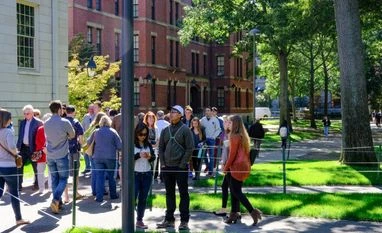Return before Trump inauguration in Jan: US colleges warn foreign students
International students in the US are worried about their visas and whether they will be able to continue their education
)
Photo: Shutterstock
Listen to This Article
More international students are enrolling in US universities than ever before, but fears of disruption have grown as President-elect Donald Trump prepares to take office. Universities have urged foreign students to return to campus before his inauguration, amid concerns over visa changes and mass deportations.
The US remains a top choice for international students, including Indians. The quality of education and interdisciplinary curriculum offered by US universities are major draws for international students.
A recent survey by Open Doors showed a 3% rise in international enrolments for the Fall 2024 semester, with projections for continued growth in 2025.
However, there's uncertainty too. "All international students are worried right now," University of Colorado Denver professor Chloe East told the BBC.
Also Read
Universities warn students
Universities have warned international students to return to the US before Trump’s inauguration on January 20. The University of Massachusetts issued a travel advisory urging its international students and faculty to come back early.
"Based on previous experience with travel bans enacted in the first Trump administration, the Office of Global Affairs has made this advisory out of an abundance of caution," the university stated.
Wesleyan University and Yale University have issued similar guidance. Yale’s Office of International Students and Scholars has hosted a webinar addressing student fears about possible immigration policy changes.
"Universities have been advising foreign students to return because they will have better chances of protection if they are already on campus," said Russell A Stamets, Partner at Circle of Counsels, a Delhi-based law firm, speaking to Business Standard. "Trump has made it clear he intends to prioritise protecting American jobs, which has caused anxiety among international students."
'International students concerned about their future'
"A lot of students have concerns about their visas and whether they'll be allowed to continue their education," said East.
Surjaditya Sarkar, an Indian biomedical engineering student at the University of Texas at Dallas, shared his worries with the Dallas Observer, a local weekly newspaper. Sarkar, currently on an L2 visa, fears he may face complications transitioning to an F visa when his current visa expires next year.
"Who's to say that by the time I turn 21, the laws around it haven’t changed?" Sarkar said.
"It's easy to say that, ‘Oh, Trump only hates these kinds of immigrants from these places,’ but it's really not that simple. It just creates an air of uncertainty," said he.
The L-2 visa is for the dependents (spouse and unmarried children under 21) of L-1 visa holders. F-1 visa is for full-time students enrolled in an academic programme.
What challenges do undocumented students face?
The Higher Ed Immigration Portal has reported that over 400,000 undocumented students are enrolled in US higher education. These students represent a diverse group:
< 88% are undergraduates, while 12% pursue graduate or professional degrees.
<6.5% are enrolled in STEM fields.
< 45.4% are Hispanic, followed by Asians from mostly China, India and Philippines (24.9%), Black students (15.2%), and White students (10.8%).
Many undocumented students are protected under the Deferred Action for Childhood Arrivals (DACA) programme, which has shielded individuals who arrived in the US as children from deportation. However, Trump has previously attempted to end DACA and pledged to enact the largest deportation operation in US history.
What policies have raised concerns?
During his first term, Trump signed an executive order banning nationals from several predominantly Muslim countries, North Korea, and Venezuela. He also proposed reducing student visa durations from four years to two, a policy later overturned by the Biden administration.
In 2020, the pandemic added to international students’ challenges. Immigration and Customs Enforcement (ICE) announced it would deny visas to students whose classes were moved online, prompting a lawsuit by Harvard and MIT. The policy was eventually rescinded.
"Undocumented students, like other immigrants, face greater risks under Trump’s proposed policies," Stamets said. "His administration has floated plans to build detention centres for individuals deemed undesirable, further stoking fears among international students."
How have universities responded?
Universities have pledged to protect their international students. While many institutions plan to challenge disruptive policies, the uncertainty surrounding Trump’s immigration approach has left students and staff preparing for potential challenges.
"Universities will make every legal effort to protect their students, as they have a philosophical and financial stake in doing so," Stamets said. "But it’s prudent to anticipate a period of potentially unpleasant disruption while Trump and universities come to an understanding. Worry is warranted, action is essential, and hope is reasonable that foreign students will be able to continue their education in the United States."
More From This Section
Don't miss the most important news and views of the day. Get them on our Telegram channel
First Published: Nov 27 2024 | 12:39 PM IST